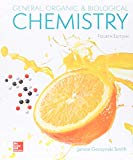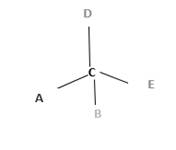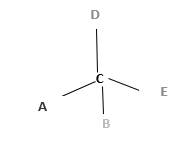
Concept explainers
(a)
Interpretation:
Mirror image of the halothane (
Concept Introduction:
Chirality is the presence of an asymmetric carbon center in a molecule and a molecule which contains a chiral center cannot superimpose on its mirror image. To consider as chiral, molecule or object and its mirror image should not superimpose. To consider as achiral, molecule or object and its mirror image should be superimposed with each other.

In the above diagram, where C is the chiral center/ asymmetric carbon center.
A, B, D, E are four different
(b)
Interpretation:
Mirror image of the dichloromethane (
Concept Introduction:
Chirality is the presence of an asymmetric carbon center in a molecule and a molecule which contains a chiral center cannot superimpose on its mirror image. To consider as chiral, molecule or object and its mirror image should not superimpose. To consider as achiral, molecule or object and its mirror image should be superimposed with each other.

In the above diagram, where C is the chiral center/ asymmetric carbon center.
A, B, D, E are four different functional groups.
Want to see the full answer?
Check out a sample textbook solution
Chapter 15 Solutions
Loose Leaf for General, Organic and Biological Chemistry with Connect 2 Year Access Card
- Label each compound as chiral or achiral. Compounds that contain a single carbon common to two rings are called spiro compounds. Because carbon is tetrahedral, the two rings are perpendicular to each other.arrow_forwardLabel each molecule with chiral centers (R) and (S). Which ones have more than one?arrow_forwardName the given compound. Make sure you include the appropriate configuration for each of the chiral centers.arrow_forward
- This is one enantiomer of the molecule. OH H CCH2-CH2-CH3 CH3 Draw the structure of the other enantiomer using wedges and dashes. Click and drag to start drawing a structure.arrow_forwardA) ОН B) HO. Molecule A is achiral and molecule B is chiral Molecule A is chiral and molecule B is achiral Both molecules are achiral. Both molecules are chiral.arrow_forwardLocate the stereogenic centers in each molecule. Compounds may have one or more stereogenic centers.arrow_forward
- Shown below is Streptomycin, an antibiotic medication used to treat a number of bacterial infections, including tuberculosis, plague, and endocarditis. Neomycin B has broad-spectrum antibacterial activity. Circle and label as many functional groups in these molecules as you can. Label each chiral carbon in Streptomycin. How many total stereoisomers exist for Streptomycin? Label each chiral carbon in Neomycin B. How many total stereoisomers exist for Neomycin B?arrow_forward1. Draw a pair of enantiomers of 2-butanol. Is 2-butanol able to rotate the plane polarized light? Explain.arrow_forwardHow many chiral center(s) are present in each molecule and how many stereoisomers are possible in each case? a) 2- Chloropentane b) 3- chloropentane c) 3- Chloro- 1- pentene draw the structures of each of the molecules on paper with showing chiral centers with a star/asterisk and mention the number of the stereoisomers for each molecule.arrow_forward
- What is the chiral center in each compound. R or Sarrow_forwardDraw a three-dimensional structure for each compound. Denote the asymmetric carbon atom with an asterisk (*). Draw the mirror image for each structure, and state whether you have drawn a pair of enantiomers of just the same molecule twice.arrow_forwardLocate the tetrahedral stereogenic center(s) in each compound. A molecule may have one or more stereogenic centers.arrow_forward
 Organic Chemistry: A Guided InquiryChemistryISBN:9780618974122Author:Andrei StraumanisPublisher:Cengage LearningChemistry: Matter and ChangeChemistryISBN:9780078746376Author:Dinah Zike, Laurel Dingrando, Nicholas Hainen, Cheryl WistromPublisher:Glencoe/McGraw-Hill School Pub Co
Organic Chemistry: A Guided InquiryChemistryISBN:9780618974122Author:Andrei StraumanisPublisher:Cengage LearningChemistry: Matter and ChangeChemistryISBN:9780078746376Author:Dinah Zike, Laurel Dingrando, Nicholas Hainen, Cheryl WistromPublisher:Glencoe/McGraw-Hill School Pub Co Organic ChemistryChemistryISBN:9781305580350Author:William H. Brown, Brent L. Iverson, Eric Anslyn, Christopher S. FootePublisher:Cengage Learning
Organic ChemistryChemistryISBN:9781305580350Author:William H. Brown, Brent L. Iverson, Eric Anslyn, Christopher S. FootePublisher:Cengage Learning


